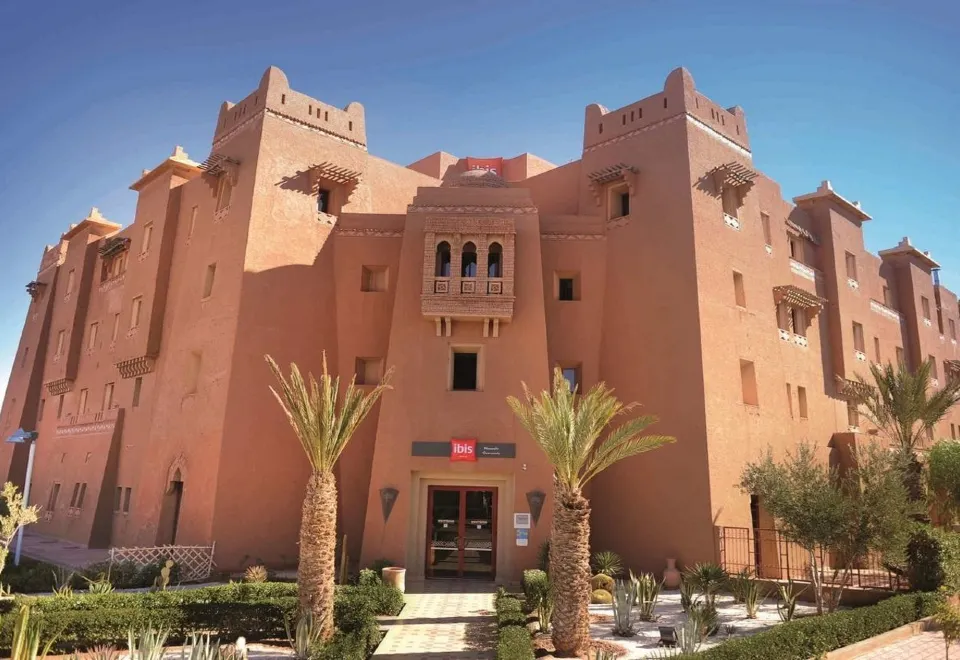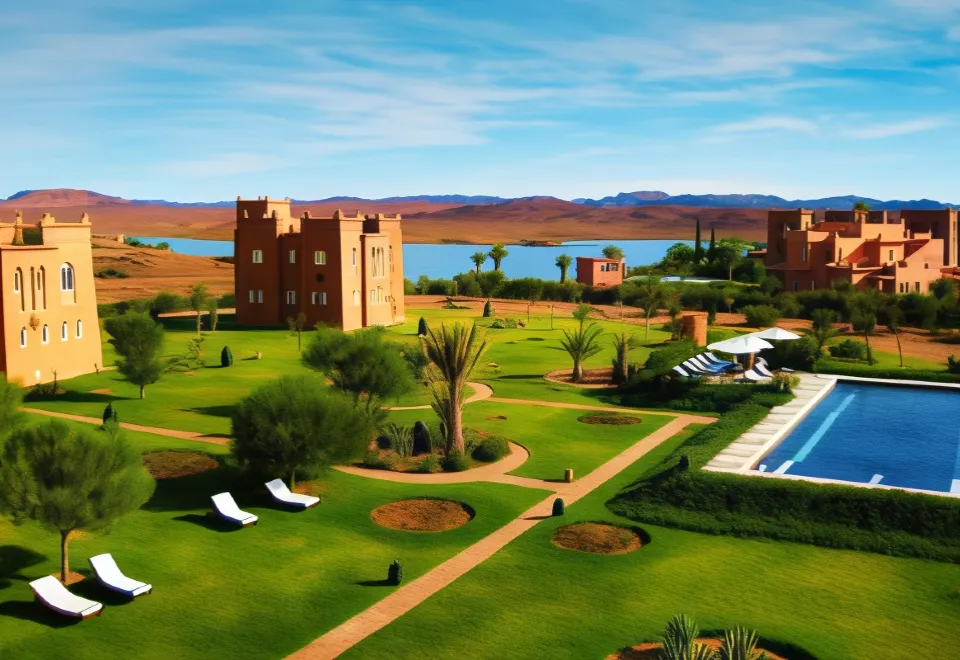Morocco has become a hub for travelers seeking unique and sustainable experiences. The country’s diverse landscapes, rich culture, and commitment to sustainable tourism make it an ideal destination for eco-conscious travelers.

The rise of eco-friendly accommodations, such as sustainable hotels and eco-lodges, has transformed the way people experience Morocco travel. These exceptional accommodations not only provide a unique stay but also contribute to the local community and environment.
Key Takeaways
- Morocco is a growing destination for sustainable tourism.
- Eco-friendly accommodations are on the rise.
- Sustainable hotels and eco-lodges offer unique experiences.
- These stays contribute to the local community and environment.
- Travelers can enjoy Morocco’s diverse landscapes and culture.
The Rise of Sustainable Tourism in Morocco
Morocco is witnessing a significant shift towards sustainable tourism, driven by the country’s commitment to eco-tourism. This shift is not only beneficial for the environment but also enhances the travel experience for visitors.
Morocco’s Commitment to Eco-Tourism
Morocco has made significant strides in promoting eco-tourism, with a focus on reducing the environmental impact of tourism. The government has implemented various initiatives to encourage sustainable practices among tour operators and accommodations. For instance, many hotels and riads are now adopting eco-friendly practices such as using solar energy and reducing water waste.
Environmental Challenges and Solutions
Despite the progress made, Morocco still faces several environmental challenges, including water scarcity and waste management. To address these issues, many sustainable tourism initiatives are being implemented. For example, some eco-lodges are using innovative water conservation techniques, while others are implementing effective waste recycling programs.
| Eco-Friendly Practices | Benefits |
|---|---|
| Solar Energy Usage | Reduces reliance on fossil fuels, lowering carbon emissions |
| Water Conservation | Preserves Morocco’s precious water resources |
| Waste Recycling | Minimizes waste sent to landfills, promoting a cleaner environment |
Exploring More Exceptional Stays Across Morocco
Discover the essence of Moroccan hospitality through its exceptional stays, where tradition meets innovation. Morocco’s accommodations are not just places to rest; they are gateways to experiencing the country’s rich cultural heritage and natural beauty.
What Makes a Moroccan Stay “Exceptional”
An exceptional stay in Morocco is characterized by its unique blend of traditional architecture, local culture, and modern comforts. Many riads and kasbahs are restored with care, preserving their original charm while offering luxurious amenities.
- Personalized service that caters to individual needs
- Authentic local experiences, such as traditional cuisine and crafts
- Sustainable practices that minimize environmental impact
Sustainability Certifications and Standards
Morocco is increasingly adopting sustainability certifications and standards for its tourism industry. Eco-friendly accommodations are recognized for their efforts in reducing carbon footprint, conserving water, and supporting local communities.
Some notable certifications include:
- EarthCheck
- Green Globe
- ISO 14001
Price Ranges for Eco-Friendly Accommodations
Eco-friendly accommodations in Morocco cater to a wide range of budgets. Prices vary from affordable riads in medinas to luxury eco-lodges in the desert.
Luxury eco-lodges: $200-$500 per night
Traditional Sustainable Architecture in Moroccan Lodgings
Sustainable architecture is at the heart of Moroccan lodgings, where ancient techniques meet modern eco-friendly practices. This blend of tradition and innovation is what makes Moroccan lodgings stand out in the world of eco-tourism.
Ancient Cooling and Heating Techniques
Moroccan architecture has long employed ingenious methods to regulate temperature without relying on modern technology. Thick walls made from local materials like clay and stone provide natural insulation, keeping interiors cool in the summer and warm in the winter. The use of small windows and intricate latticework further enhances this effect, minimizing the need for artificial cooling and heating.
Local Materials and Building Methods
The use of local materials is a cornerstone of sustainable architecture in Moroccan lodgings. Materials such as clay, wood, and stone are not only locally sourced but also require minimal processing, reducing the carbon footprint of construction. Traditional building methods, passed down through generations, ensure that the construction process itself remains environmentally friendly.
Modern Adaptations of Traditional Designs
While traditional designs form the backbone of Moroccan lodgings, modern adaptations are increasingly incorporating eco-friendly features. Solar panels, rainwater harvesting systems, and greywater recycling are being integrated into traditional structures, enhancing their sustainability. This fusion of old and new not only preserves cultural heritage but also significantly reduces the environmental impact of these lodgings.
| Traditional Technique | Modern Adaptation | Benefit |
|---|---|---|
| Thick clay walls | Insulated clay walls | Improved thermal regulation |
| Small windows | Double-glazed windows | Enhanced energy efficiency |
| Local materials | Sustainably sourced materials | Reduced environmental impact |
Eco-Friendly Riads and Kasbahs in Historic Cities
In the heart of Morocco’s ancient cities, eco-friendly riads and kasbahs offer travelers a unique cultural experience while promoting environmental conservation. These historic accommodations have been restored with sustainability in mind, blending traditional architecture with modern eco-friendly practices.

Marrakech’s Green Hideaways
Marrakech is home to numerous eco-friendly riads that have been transformed from traditional houses into sustainable lodgings. These riads utilize local materials, such as clay and wood, and incorporate modern green technologies like solar panels and rainwater harvesting systems.
Fez’s Sustainable Heritage Accommodations
Fez, with its rich cultural heritage, boasts sustainable heritage accommodations that preserve the city’s ancient architecture while minimizing environmental impact. Many of these accommodations have adopted eco-friendly practices, such as using locally sourced materials and reducing water consumption.
Restored Kasbahs in Southern Morocco
The kasbahs of southern Morocco, once majestic fortresses, have been restored as eco-friendly kasbahs, offering luxurious yet sustainable accommodations. These kasbahs combine traditional Berber architecture with modern sustainable practices, providing a unique experience for travelers.
The restoration of these historic buildings not only preserves Morocco’s cultural heritage but also promotes sustainable tourism. By choosing to stay in eco-friendly riads and kasbahs, travelers can enjoy an authentic Moroccan experience while supporting environmental conservation efforts.
Desert Eco-Lodges: Sustainable Luxury in the Sahara
In the heart of the Sahara, a new generation of eco-lodges is redefining sustainable luxury in one of the world’s most extreme environments.
These desert eco-lodges are designed to provide luxurious experiences while minimizing their environmental footprint. One of the key features of these eco-lodges is their use of solar power. By harnessing the abundant desert sunlight, these lodges reduce their reliance on fossil fuels, lowering their carbon emissions.
Solar-Powered Desert Camps
The integration of solar-powered systems in desert camps is a significant step towards sustainable tourism. These systems provide energy for lighting, heating, and cooling, ensuring that guests can enjoy luxurious amenities while staying eco-friendly.
Water Conservation Innovations
Water conservation is another critical aspect of desert eco-lodges. Innovative techniques such as greywater recycling and rainwater harvesting are employed to minimize water waste. These methods not only conserve water but also reduce the strain on local resources.
| Water Conservation Method | Description | Impact |
|---|---|---|
| Greywater Recycling | Recycling wastewater from sinks, showers, and washing machines for irrigation and flushing toilets. | Reduces water consumption by up to 50% |
| Rainwater Harvesting | Collecting and storing rainwater for various uses, including irrigation and drinking water. | Decreases reliance on external water sources |
Community-Supported Desert Accommodations
Many desert eco-lodges are committed to supporting local communities. By sourcing materials locally and employing local staff, these lodges contribute to the local economy and help preserve traditional skills and practices.
By choosing to stay at a desert eco-lodge, travelers are not only experiencing sustainable luxury but also supporting conservation efforts and local communities in the Sahara.
Coastal and Mountain Eco-Retreats
The varied geography of Morocco provides numerous opportunities for sustainable tourism, particularly in its coastal and mountain regions. Morocco’s diverse landscapes offer a unique blend of eco-retreats that cater to different preferences, whether you’re looking for a relaxing beach experience or an adventurous mountain trek.
Atlantic Coast Sustainable Resorts
The Atlantic coast of Morocco is home to several sustainable resorts that offer luxurious accommodations while minimizing environmental impact. These resorts often employ eco-friendly practices such as using renewable energy sources, reducing water waste, and promoting local biodiversity. Visitors can enjoy a range of activities, from surfing to birdwatching, in a setting that prioritizes sustainability.

Mediterranean Eco-Friendly Getaways
On the Mediterranean coast, eco-friendly getaways offer a tranquil retreat with a focus on sustainable living. These resorts often feature locally sourced materials in their architecture and decor, supporting the local economy and reducing carbon footprint. Guests can indulge in organic cuisine, relax on pristine beaches, or explore the nearby natural reserves.
Atlas Mountains Community Lodges
In the Atlas Mountains, community lodges provide a unique opportunity to experience rural Moroccan life while supporting local communities. These lodges are often run by local families and offer authentic cultural experiences, including traditional cooking classes and guided hikes. By staying at these lodges, visitors contribute directly to the local economy and help preserve traditional ways of life.
Morocco’s coastal and mountain eco-retreats demonstrate the country’s commitment to sustainable tourism, offering visitors a chance to enjoy its natural beauty while supporting eco-friendly practices.
Practical Guide to Booking Sustainable Stays
With the growing interest in eco-tourism, Morocco’s sustainable stays are becoming increasingly popular. Booking a sustainable stay requires some research and planning to ensure that your choice aligns with your eco-conscious values.
Verifying Sustainability Claims
When searching for eco-friendly accommodations, it’s crucial to verify the sustainability claims made by the lodgings. Look for recognized certifications such as Eco-Tourism Certification or Green Key. These certifications indicate that the establishment adheres to certain environmental standards.
Best Booking Platforms for Eco-Lodges
Several booking platforms specialize in eco-lodges and sustainable stays. Some of the top platforms include:
- EcoHotels – A platform dedicated to eco-friendly hotels worldwide.
- Booking.com’s Eco-Lodge section, which filters accommodations based on their environmental practices.
Seasonal Considerations for Sustainable Travel
The time of year you visit Morocco can impact your sustainable travel experience. Consider traveling during the shoulder season to avoid peak tourist numbers and reduce your carbon footprint.
Packing Tips for Eco-Conscious Travelers
Packing light and bringing reusable items such as water bottles and bags can significantly reduce your environmental impact. Don’t forget to include eco-friendly toiletries and clothing suitable for Morocco’s climate.
Conclusion: The Future of Sustainable Tourism in Morocco
As Morocco continues to evolve as a premier destination for travelers, the future of sustainable tourism looks bright. With a growing array of eco-friendly accommodations and a strong commitment to environmental stewardship, Morocco is poised to become a leader in sustainable tourism.
The country’s diverse landscapes, rich cultural heritage, and warm hospitality make it an ideal location for travelers seeking unique and responsible travel experiences. By supporting local communities and promoting environmentally friendly practices, visitors can contribute to Morocco’s sustainable future.
As the demand for sustainable tourism continues to grow, Morocco’s tourism industry is well-positioned to meet the needs of eco-conscious travelers. With its unique blend of traditional architecture, stunning natural beauty, and commitment to sustainability, Morocco is set to remain a top destination for years to come.
FAQ
What makes a Moroccan stay “exceptional”?
Exceptional stays in Morocco are characterized by their unique blend of traditional architecture, sustainable practices, and luxurious amenities, offering travelers an immersive cultural experience while minimizing environmental impact.
How can I verify the sustainability claims of a Moroccan lodge?
To verify sustainability claims, look for recognized certifications such as EarthCheck or Green Key, and research the lodge’s environmental policies, energy sources, and community engagement initiatives.
What are the price ranges for eco-friendly accommodations in Morocco?
Eco-friendly accommodations in Morocco vary in price, ranging from budget-friendly riads starting at around $20 per night to luxury eco-lodges costing upwards of $500 per night, depending on the location, amenities, and level of luxury.
Are there any community-supported desert accommodations in the Sahara?
Yes, there are community-supported desert accommodations in the Sahara, such as eco-lodges and desert camps that partner with local communities to provide authentic experiences while contributing to the local economy.
What are some seasonal considerations for sustainable travel in Morocco?
Travelers should consider visiting during the shoulder season (April-May or September-October) to avoid peak tourist season, reduce their carbon footprint, and support local businesses during the off-season.
How can I pack for an eco-conscious trip to Morocco?
To pack for an eco-conscious trip, consider bringing reusable bags, refillable water bottles, and eco-friendly toiletries, and choose clothing made from sustainable materials.
What are some of the traditional sustainable architecture features found in Moroccan lodgings?
Traditional sustainable architecture features in Moroccan lodgings include ancient cooling and heating techniques, such as thick walls and shaded courtyards, as well as the use of local materials like clay, wood, and stone.
Can I find eco-friendly riads in historic cities like Marrakech and Fez?
Yes, many historic cities in Morocco, such as Marrakech and Fez, offer eco-friendly riads that have been restored using sustainable practices and materials, providing a unique cultural experience.

